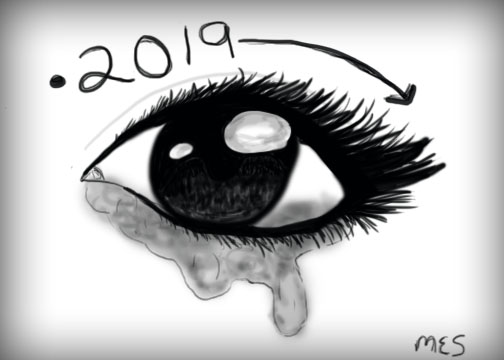Sensitivity growing in today’s society
It’s hard to comment on anything nowadays on social media or let alone say a remark to someone in person. One bad choice of wording, a misunderstanding or accidentally mispronouncing something wrong could lead someone to feel offended. Some comments that seem perfectly normal, whether just sharing a thought or an opinion, can leave people feeling offended as well. Has today’s society grown us to become more sensitive? Or could it simply be more accepting and open-minded?
Although found in person frequently as well, the more permanent, public way to see comments taken in different ways can be found on social media. As an example, looking through TikTok, a platform that allows people to create funny videos where they can lip-dub to different songs and audios, or even make jokes, a lot of the time in the comment section, many users are correcting other users on what their videos should be, or if they make a mistake, it will go unnoticed.
A trend currently going around on TikTok is the “Beetle Juice Challenge,” where TikTok-ers will lip dub to the song “Say My Name” from the hit Broadway musical “Beetlejuice.” Although Beetlejuice is a deadly spirit, the challenge interprets the character as a clown, switching between different background colors to create the illusion of different makeup. However, as silly as this challenge may be, the comment sections tend to be flooded with comments preaching how Beetlejuice is not a clown, and people need to recognize that. From there, these types of comments and accusations thrown at videos created as jokes leave the creators to have to constantly comment and apologize for the “misunderstanding” or for their “mistake.”
An argument in recent years asks whether or not people are using social media as a shield, as most people prefer to comment their opinion online, rather than to approach someone verbally. This gives the user a virtual “shield” to hide behind, and gives the user more time to think of a comeback or something intermixed with an intelligent-sounding fact to stun the receiving user. Although social media can be avoided, and its use is voluntary, and comment sections on different platforms can be turned off, are people turning this privilege to speak their opinion too far? Are people simply using these “shields” in order to sound more intelligent and prove a point online, or is it simply based upon a person’s sensitivity?
In today’s generation, as more kids start to get older and progress through childhood and school, it seems as though they are becoming more understanding with different topics. Leaving room for personal opinions on individual situations, most children in today’s society grow up learning to be more open-minded, compared to generations who are previously known difficulty to have open-mindedness.
As an example, more kids grow up today accepting same-sex marriage, abortions and other delicate topics. Compared to past generations, who are more mixed when it comes to same-sex marriage and other similar topics, children of today’s society are growing up to know it as a normality, differientiating from when people were fighting against it. However, is this more open-minded society leading to current sensitivity levels or a push in it’s direction?
In past years, current adults grew up learning to work for what they want in life. In school, hobbies and sports, there was only one MVP, one trophy for the winning team and basically, a smaller amount of awards given to whoever worked the hardest. In today’s society, the current generation growing into adults, most of the time, trophies were and are handed out like candy. Participation trophies were given the most frequently, as anyone who attempted to join the local baseball team was handed a trophy at the end of the season. For the child who decided to learn to dance at a studio, was once also handed some sort of pin, trophy or certificate in return for participating.
In an article found on chabad.com, a story about a teacher and a birthday celebration was unfolded. When the students went to sing “Happy Birthday,” the teacher told them that whomever sang the nicest would receive a prize. However, at the end of the song, everyone was handed a prize because everyone was a winner for singing nicely.
Wherever the origins of today’s growing sensitivity came from, more and more comments are being made on how something in inaccurate or, in their opinion, “not correct.” Are people losing the basic understanding that everyone is different? Are people unaware that most people have different opinions and disagreeing beliefs? Or is the race to become the most “correct” affecting the way people decide to take things? Looking upon the possible several causes and main reasonings to why this increase could be taking place, everyday, the growth of sensitivity in people tends to grow more and more rapidly.



